Hello there, fellow dog lover! I’m Dr. Candy, your friendly holistic veterinarian. Today, we’re going to talk about a topic that’s very close to my heart – Belgian Malinois Dental Health. As a dog parent, I’m sure you understand how crucial dental health is to your furry friend’s overall well-being.
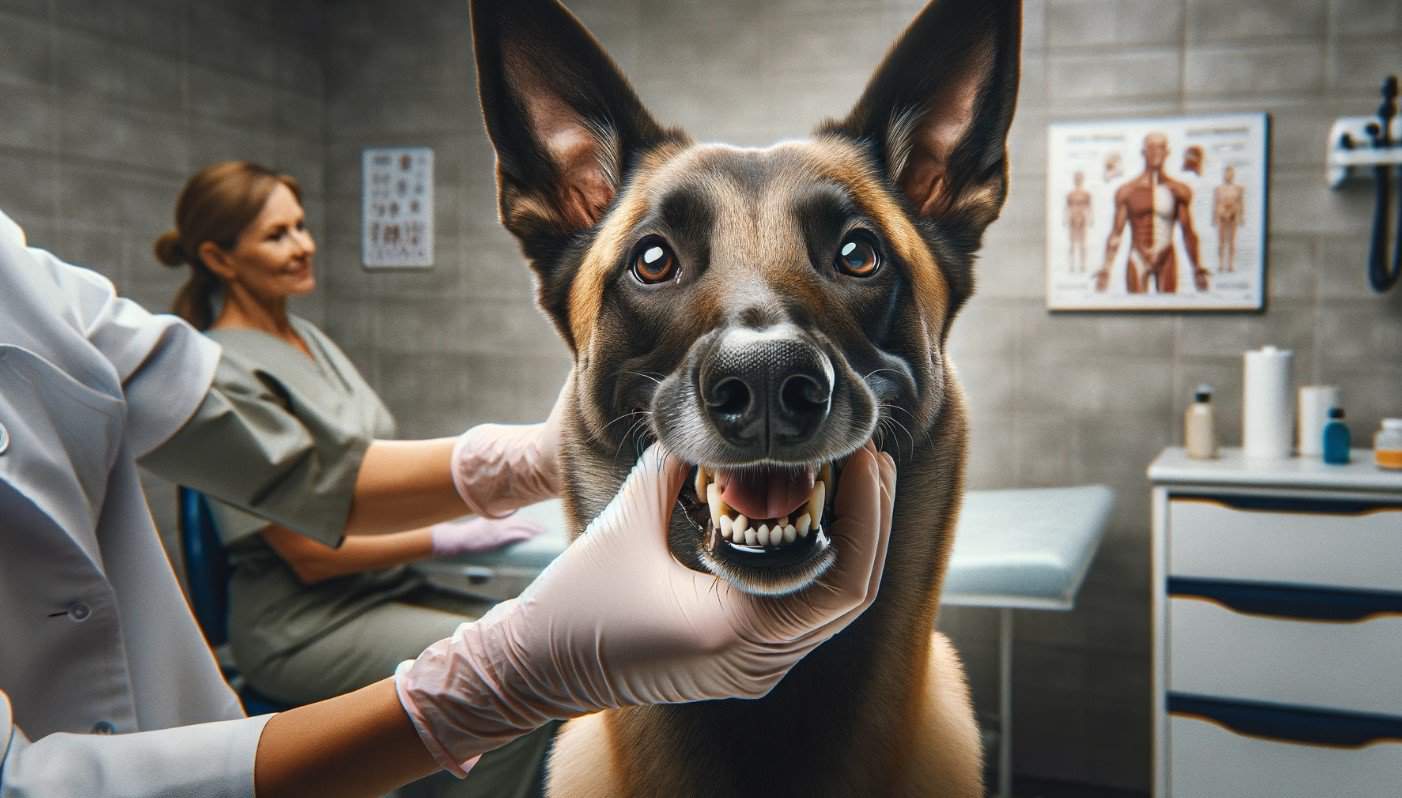
Just like us, our canine companions can suffer from a range of dental issues. This is particularly true for Belgian Malinois, a breed known for its intelligence and energy, but also prone to certain dental health problems. From bad breath to gum disease, these issues can cause discomfort and even serious health complications if not addressed promptly.
But don’t worry, I’m here to guide you through the signs of dental disease, common dental health issues, and both conventional and holistic treatments. I’ll even share my top recommended dental chews and products to help keep your Belgian Malinois’ teeth sparkling clean and healthy. So, let’s get started on our journey to better dental health for your beloved Belgian Malinois!
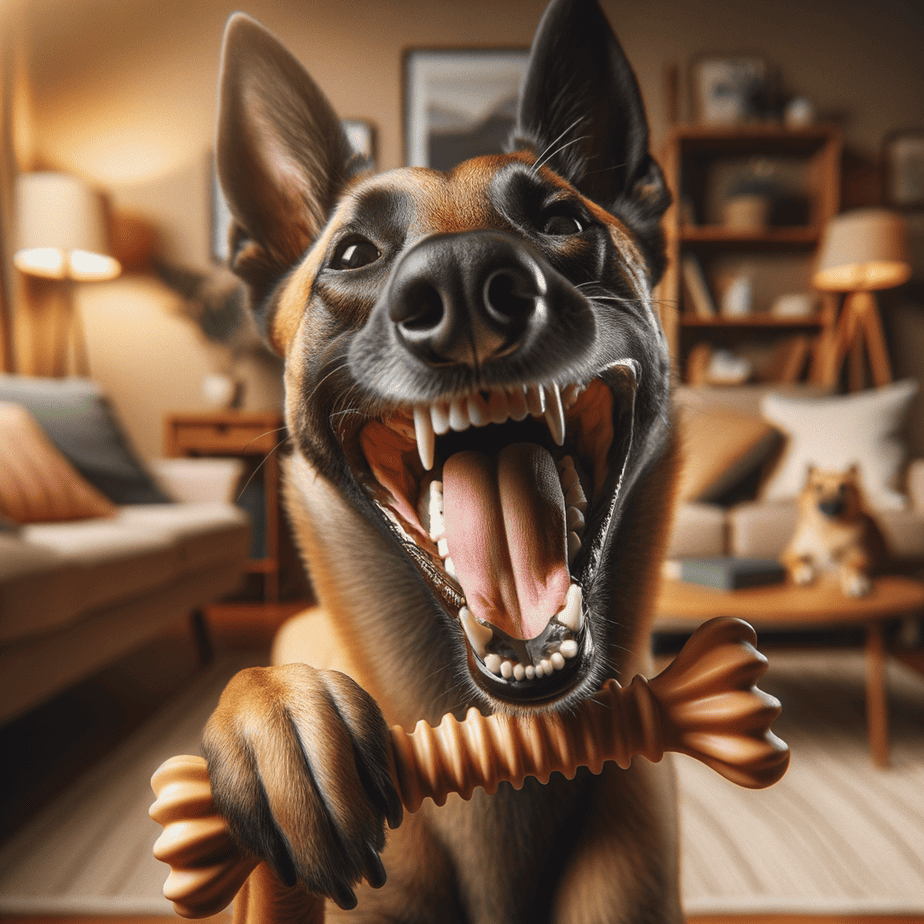
Signs of Dental Disease in Belgian Malinois
Recognizing the signs of dental disease in your Belgian Malinois is a crucial step in maintaining their overall health. As a holistic veterinarian, I’ve seen many cases where dental problems were overlooked, leading to more serious health conditions down the line. Here, we will delve into the signs of dental disease in Belgian Malinois, giving you the knowledge to spot potential issues early and seek the right treatment.
Bad Breath
Bad breath is more than just a nuisance – it could be a sign of dental disease. If your Belgian Malinois’ breath is persistently foul, it may be time to consult a vet. While it’s normal for dogs to have a distinctive breath, an unusually strong, foul odor could indicate a problem.
Changes in Eating Habits
Another common sign of dental disease is a change in eating habits. If your dog is avoiding hard food, chewing on one side, or dropping food while eating, it might be experiencing dental pain. Belgian Malinois are usually enthusiastic eaters, so any change in their eating behavior should be noted.
Swollen or Bleeding Gums
Swollen, red, or bleeding gums are often a sign of gingivitis, an inflammation of the gums that can lead to periodontal disease if left untreated. Regularly inspect your Belgian Malinois’ mouth for these symptoms.
Discoloration or Tartar Build-up
Yellow or brown discoloration and tartar build-up on your dog’s teeth are signs of plaque accumulation, which can lead to severe dental diseases. Regular teeth cleaning can prevent this.
Loose or Broken Teeth
Loose or broken teeth are not normal in dogs and are often a sign of dental disease. If you notice this in your Belgian Malinois, seek veterinary help immediately.
Excessive Drooling
While some drooling is normal, especially in large breeds like Belgian Malinois, excessive drooling can be a sign of dental disease, especially if it’s combined with other symptoms.
By understanding these signs of dental disease in Belgian Malinois, you can ensure your furry friend maintains optimum dental health. If you notice any of these symptoms, don’t hesitate to consult a vet. Remember, early detection is key to preventing severe dental diseases.
Common Dental Health Issues In Belgian Malinois
As a veterinarian, I’ve seen many Belgian Malinois dental health cases. These dogs are generally robust and healthy, but like any breed, they can be prone to certain dental health issues.
- Periodontal disease: This is a common issue in many dog breeds, including the Belgian Malinois. It starts with plaque buildup that hardens into tartar. If not removed, it can lead to gum inflammation, tooth loss, and even systemic issues like heart disease.
- Broken teeth: Belgian Malinois are active dogs with a strong bite force. They love to chew, and this can sometimes lead to broken teeth. Broken teeth can be painful and can lead to infections if not treated.
- Bad breath: Bad breath in dogs is not just unpleasant, it’s often a sign of underlying dental health issues. In Belgian Malinois, it could indicate anything from gum disease to digestive issues.
Addressing these Belgian Malinois dental health issues early is key. Regular dental check-ups and cleanings can help prevent these problems and keep your dog’s mouth healthy. Additionally, good home dental care, including regular brushing and the use of dental chews, can make a big difference.
Remember, your Belgian Malinois can’t tell you when they’re in pain. It’s up to you to keep an eye on their dental health and seek veterinary care when needed.

Conventional Dental Health Treatments
When addressing Belgian Malinois dental health, it’s important to be aware of the conventional treatments available. These treatments are commonly prescribed by vets and can be crucial in maintaining oral health and preventing dental disease.
Anesthetic Dental Cleanings
One of the most common treatments is anesthetic dental cleanings. This procedure involves putting your Belgian Malinois under anesthesia to allow for a thorough cleaning of their teeth. It helps eliminate plaque and tartar buildup, which are among the main causes of dental disease. While under anesthesia, the vet can also examine the dog’s oral cavity for any signs of dental issues that may require further treatment.
Potential Individual Health Obstacles
However, while anesthetic dental cleanings can be beneficial, they are not without risks. For some Belgian Malinois, individual health obstacles may make these procedures more risky.
- Heart problems: Anesthesia can pose risks for dogs with heart conditions. It’s crucial to discuss this with your vet if your Belgian Malinois has a diagnosed heart problem.
- Drug sensitivities: Some dogs may have sensitivities or allergies to certain anesthetic drugs. This can lead to complications during the procedure.
- Seizures: If your dog has a history of seizures, anesthesia could potentially trigger an episode. Always inform your vet about any history of seizures before any procedure involving anesthesia.
- Extreme age: Older dogs may have a higher risk of complications from anesthesia. If your Belgian Malinois is of advanced age, discuss the potential risks and benefits with your vet.
While these potential health obstacles shouldn’t deter you from considering anesthetic dental cleanings, they should prompt a thorough discussion with your vet. It’s important to weigh the potential risks against the benefits to make an informed decision about your Belgian Malinois’ dental health. After all, our ultimate goal is to ensure our furry friends enjoy the best quality of life possible.
When it comes to Belgian Malinois Dental Health, a holistic approach can be quite effective. This involves taking into account the overall health and lifestyle of your Belgian Malinois, not just focusing on their teeth. One of the pioneers of this approach is Dr. Candy, who advocates for a combination of a healthy diet and oral health specific probiotics.
Diet – Low Carbs, Avoid Added Sugars, Enzymes In Fresh Food
Dr. Candy emphasizes the importance of a well-balanced diet for your Belgian Malinois. This includes a diet low in carbs and devoid of added sugars. The reason behind this is that these food components can lead to plaque build-up, which in turn can lead to dental issues. Instead, focus on providing your Belgian Malinois with fresh foods rich in enzymes. These enzymes can help break down food particles in the mouth, reducing the risk of plaque build-up.
- Low-carb foods: These include meat, fish, eggs, and certain vegetables.
- Foods without added sugars: Avoid processed foods and treats that contain added sugars. Instead, opt for natural treats such as carrots or apples.
- Enzyme-rich foods: These include fresh fruits and vegetables, raw meat, and fermented foods.
Remember, a healthy diet is a foundation for good dental health. It’s not just about brushing your Belgian Malinois’s teeth regularly, but also about providing them with the right nutrients.
Oral Health Specific Probiotics
Alongside a healthy diet, Dr. Candy recommends using oral health specific probiotics. Probiotics are beneficial bacteria that can help maintain a healthy balance of microorganisms in your Belgian Malinois’s mouth. This balance is crucial in preventing dental diseases.
One product that Dr. Candy highly recommends is Probiora for Dogs, an oral health targeted probiotic. This product is specifically designed to promote oral health in dogs. It contains beneficial bacteria that can help fight off harmful bacteria in your Belgian Malinois’s mouth, reducing the risk of dental diseases.
Using Probiora for Dogs is quite simple. You just need to sprinkle it on your Belgian Malinois’s food once a day. It’s a simple addition to their routine that can make a big difference in their dental health.
Remember, Belgian Malinois Dental Health is not just about regular cleanings and check-ups. It’s about taking a holistic approach that includes a healthy diet and the use of oral health specific probiotics. With this approach, you can help ensure that your Belgian Malinois has a healthy mouth for years to come.

Dr. Candy’s Recommended Dental Chews & Products
As a dog parent, you might have been tempted by the plethora of commercially promoted dental chews, promising to keep your Belgian Malinois’s teeth sparkling clean. However, it’s important to understand that these products often fail to deliver on their promises. Many of these chews are packed with harmful ingredients and artificial additives that can damage your dog’s gut health and overall wellness. What’s more, many of these dental chews don’t effectively clean your dog’s teeth and can even pose a choking hazard.
Another popular product marketed for canine dental health is drinking water additives. While these products claim to improve your dog’s oral health, they can actually harm the beneficial bacteria in your dog’s gut. This can lead to a host of other health issues, making these products counterproductive in the long run.
So, what should you give your Belgian Malinois to promote their dental health? Dr. Candy recommends a variety of natural products, focusing on single source natural proteins. These can effectively clean your dog’s teeth while also providing them with essential nutrients.
Tendons
Tendons are a fantastic natural chew for your Belgian Malinois. They are tough and fibrous, which helps to scrape off plaque and tartar from your dog’s teeth. Plus, they are a good source of protein and collagen, promoting good joint health.
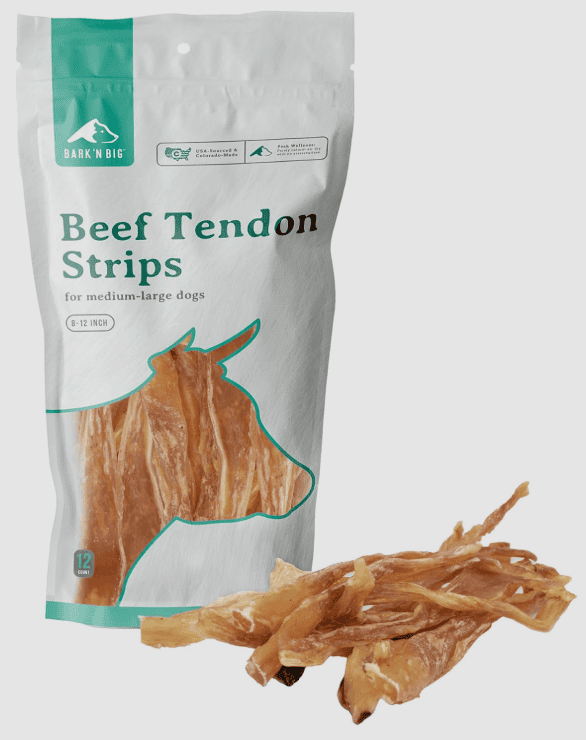
Raw Marrow Bones
Raw marrow bones are another excellent choice for maintaining your dog’s dental health. They are a natural source of calcium and phosphorus, which are essential for healthy teeth and bones. Furthermore, the act of gnawing on bones can help to clean your dog’s teeth and gums.
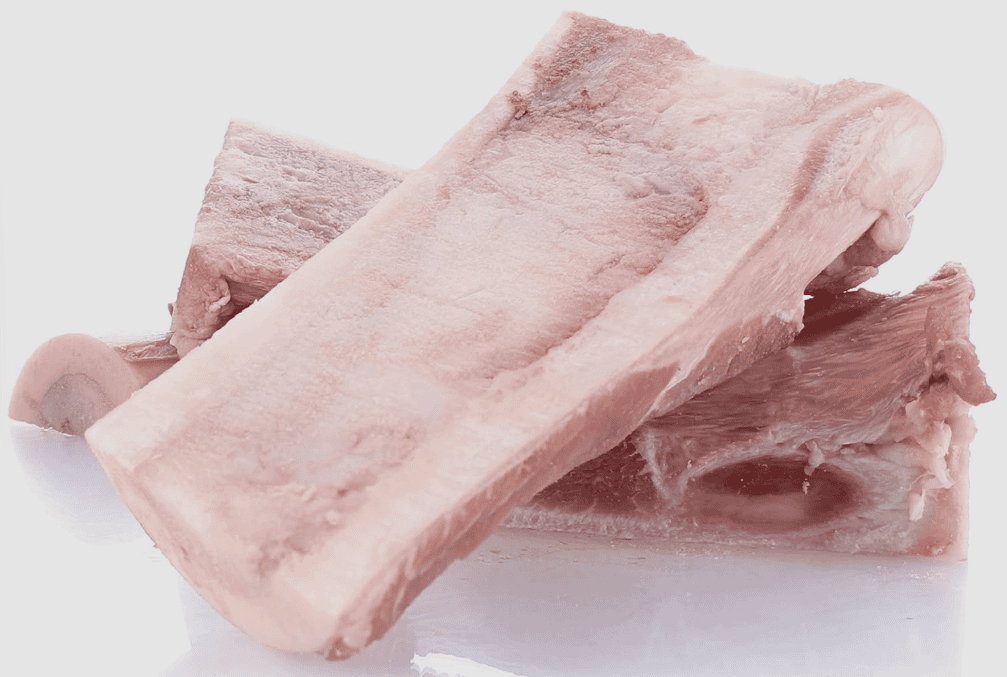
Bully Sticks
Bully sticks are made from 100% beef muscle, providing a natural and digestible chew for your dog. They can effectively remove plaque and tartar and are a good source of protein. However, always supervise your dog while they’re chewing on a bully stick to prevent any choking hazard.
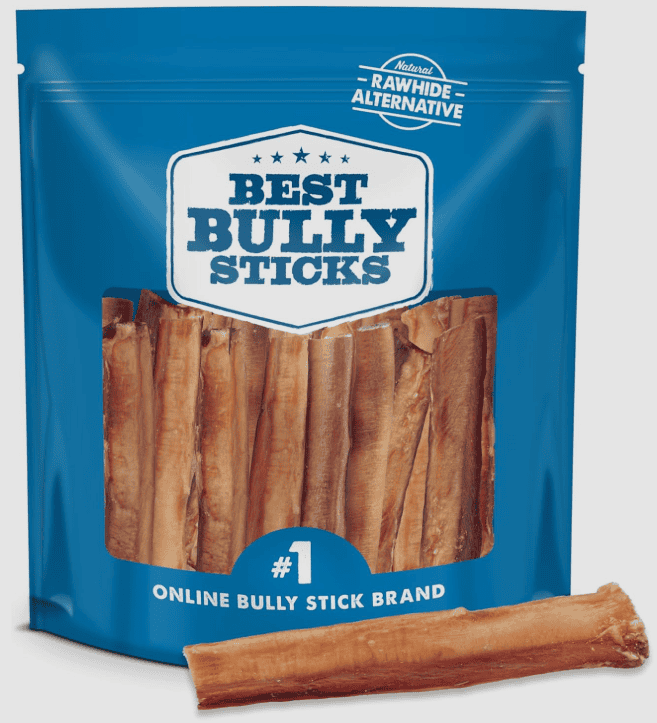
When it comes to Belgian Malinois Dental Health, the key is to choose products that are natural and beneficial for your dog’s overall health. Remember, your dog’s dental health is intrinsically linked to their overall well-being, so it’s essential to choose products that support both. With the right chews and a regular cleaning routine, you can help ensure your Belgian Malinois has a bright and healthy smile.
Frequently Asked Questions
- Q: What causes bad breath in Belgian Malinois dogs?
A: Bad breath in Belgian Malinois dogs can be caused by various factors such as poor dental hygiene, gum disease, tartar buildup, tooth decay, or underlying health issues.
- Q: How can I improve my Belgian Malinois’ dental health?
A: To improve your Belgian Malinois’ dental health, you can regularly brush their teeth using a dog-specific toothbrush and toothpaste, provide dental chews or toys for chewing, and schedule regular professional dental cleanings with your veterinarian.
- Q: Are there any specific dental products recommended for Belgian Malinois dogs?
A: There are various dental products available for dogs, including toothbrushes, toothpaste, dental chews, and water additives. It is recommended to choose products specifically designed for dogs and consult with your veterinarian for suitable recommendations.
- Q: How often should I brush my Belgian Malinois’ teeth?
A: Ideally, you should aim to brush your Belgian Malinois’ teeth at least 2-3 times a week. However, daily brushing is the most effective way to maintain good dental hygiene and prevent bad breath.
- Q: When should I seek veterinary help for my Belgian Malinois’ bad breath?
A: If your Belgian Malinois’ bad breath persists despite regular dental care, or if you notice other concerning symptoms such as bleeding gums, loose teeth, or changes in eating habits, it is recommended to seek veterinary assistance for a thorough dental examination and appropriate treatment.
